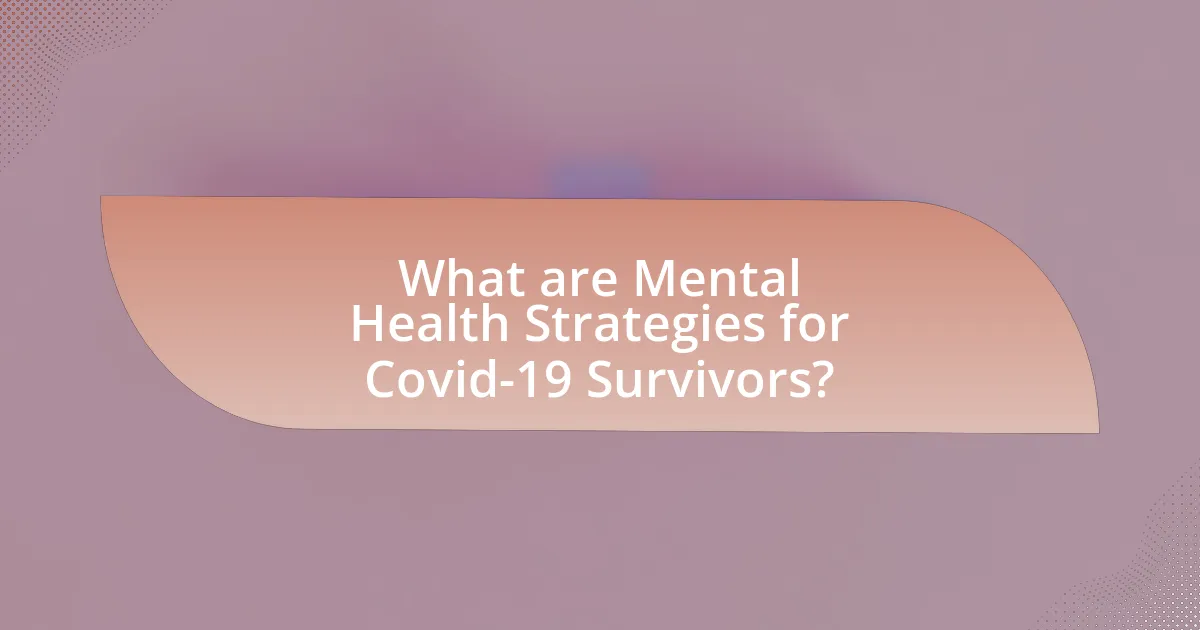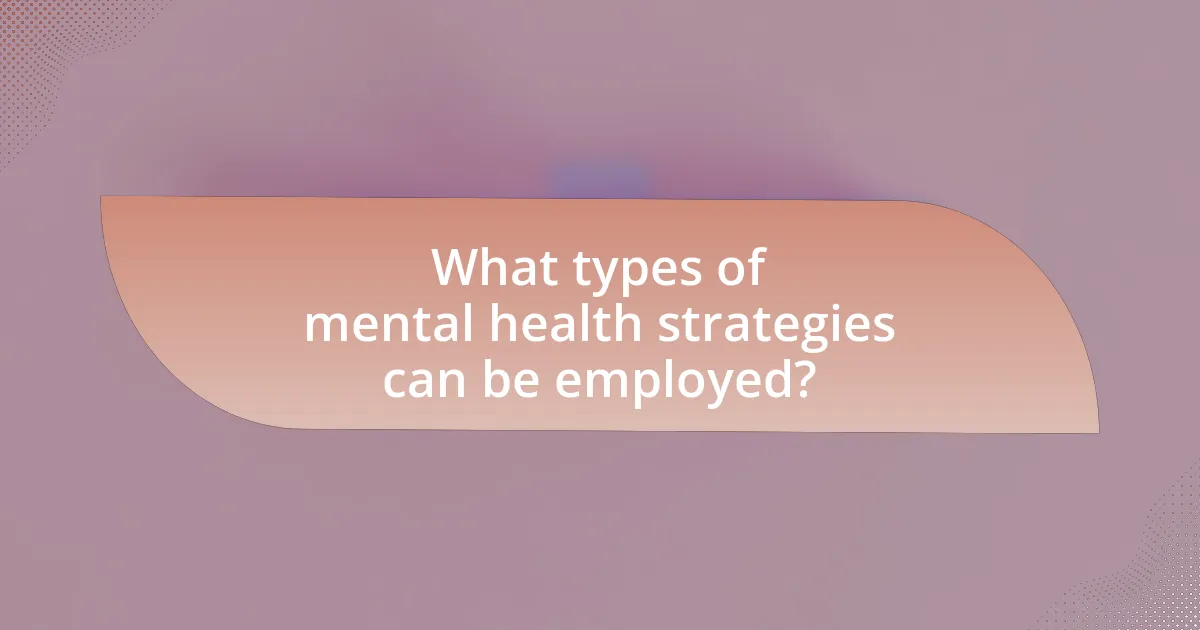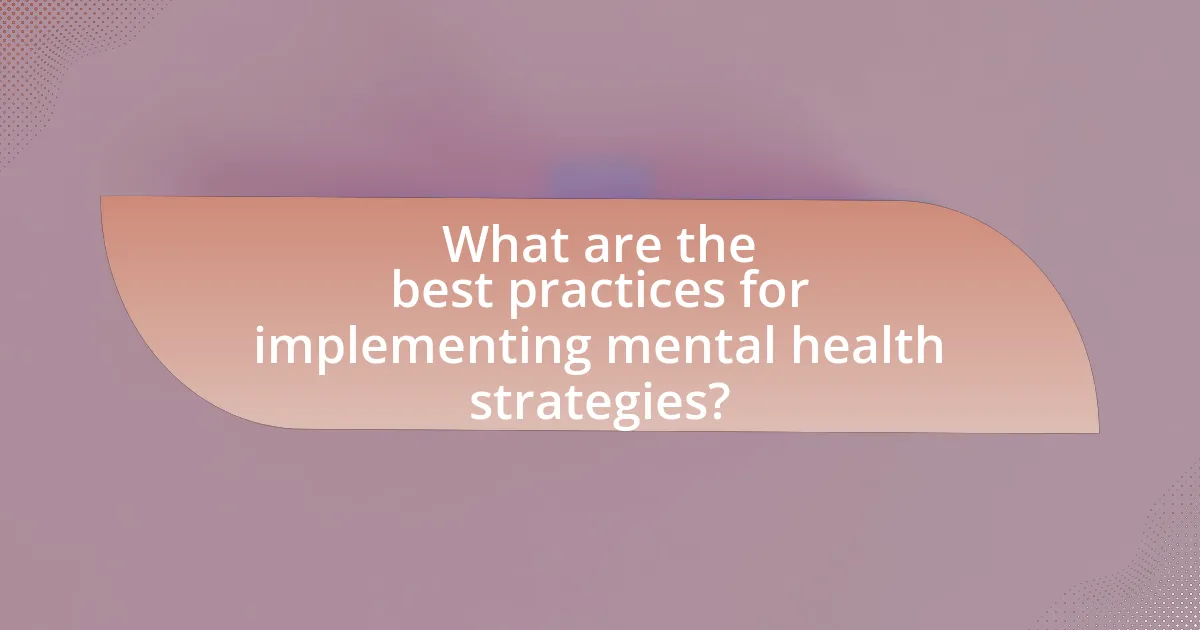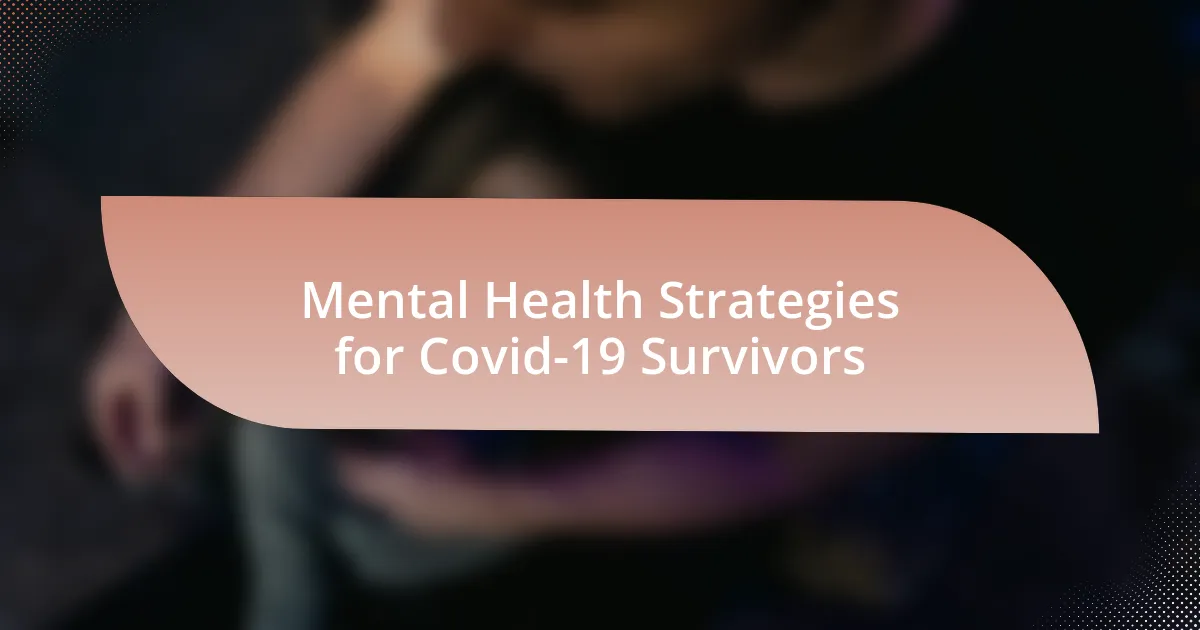Mental health strategies for Covid-19 survivors are essential for addressing the psychological challenges that arise post-illness, including anxiety, depression, and post-traumatic stress disorder (PTSD). Key strategies include cognitive behavioral therapy (CBT), mindfulness practices, social support networks, and regular physical activity, all of which have been shown to improve mental well-being. The article highlights the prevalence of mental health issues among survivors, the importance of targeted interventions, and practical tips for integrating these strategies into daily life. Additionally, it discusses the long-term effects of neglecting mental health and the role of community support in recovery.

What are Mental Health Strategies for Covid-19 Survivors?
Mental health strategies for Covid-19 survivors include cognitive behavioral therapy (CBT), mindfulness practices, social support, and physical activity. CBT helps individuals reframe negative thoughts and develop coping mechanisms, which is crucial as studies indicate that survivors often experience anxiety and depression. Mindfulness practices, such as meditation and deep-breathing exercises, have been shown to reduce stress and improve emotional regulation. Engaging with social support networks, whether through family, friends, or support groups, fosters a sense of belonging and reduces feelings of isolation, which is vital given the social disruptions caused by the pandemic. Additionally, regular physical activity has been linked to improved mood and mental health, as exercise releases endorphins and can alleviate symptoms of anxiety and depression.
How do Covid-19 survivors experience mental health challenges?
Covid-19 survivors often experience significant mental health challenges, including anxiety, depression, and post-traumatic stress disorder (PTSD). Research indicates that approximately 30% of individuals recovering from Covid-19 report symptoms of anxiety and depression, which can be attributed to the stress of illness, social isolation, and the uncertainty surrounding the pandemic. A study published in the journal “The Lancet Psychiatry” found that survivors may also face cognitive impairments, which can exacerbate feelings of frustration and helplessness. Furthermore, the stigma associated with the virus can lead to social withdrawal, compounding mental health issues. These challenges highlight the need for targeted mental health strategies to support Covid-19 survivors in their recovery.
What specific mental health issues are prevalent among Covid-19 survivors?
Covid-19 survivors commonly experience anxiety, depression, post-traumatic stress disorder (PTSD), and cognitive impairments. Research indicates that approximately 30% of Covid-19 survivors report symptoms of anxiety and depression, while PTSD symptoms can affect around 20% of those who have been hospitalized due to the virus. A study published in The Lancet Psychiatry by Taquet et al. (2021) found that cognitive issues, including memory and attention deficits, are also prevalent among survivors, affecting nearly 34% of patients. These mental health challenges are linked to the stress of illness, social isolation, and the impact of the pandemic on daily life.
How does the experience of illness impact mental well-being?
The experience of illness significantly impacts mental well-being by increasing the risk of anxiety, depression, and post-traumatic stress disorder (PTSD). Research indicates that individuals recovering from serious illnesses, such as COVID-19, often report heightened levels of psychological distress due to factors like fear of mortality, social isolation, and changes in daily functioning. A study published in the journal “Psychological Medicine” found that nearly 30% of COVID-19 survivors experienced symptoms of anxiety and depression, highlighting the mental health challenges associated with physical illness. This correlation underscores the necessity for targeted mental health strategies to support individuals navigating the psychological aftermath of their illness.
Why is it important to address mental health in Covid-19 survivors?
Addressing mental health in Covid-19 survivors is crucial because many individuals experience psychological distress, including anxiety, depression, and post-traumatic stress disorder (PTSD) after their illness. Research indicates that approximately 30% of Covid-19 survivors report mental health issues, highlighting the significant prevalence of these conditions. Furthermore, untreated mental health problems can lead to impaired daily functioning, decreased quality of life, and increased healthcare costs. Therefore, prioritizing mental health support for Covid-19 survivors is essential to promote overall recovery and well-being.
What are the long-term effects of neglecting mental health in survivors?
Neglecting mental health in survivors can lead to long-term effects such as chronic anxiety, depression, and post-traumatic stress disorder (PTSD). These conditions can persist for years, significantly impairing daily functioning and quality of life. Research indicates that untreated mental health issues can result in increased rates of substance abuse, social isolation, and physical health problems, including cardiovascular diseases. A study published in the Journal of Affective Disorders found that individuals with unresolved mental health issues post-trauma are at a higher risk for developing chronic illnesses, highlighting the importance of addressing mental health proactively.
How can improved mental health contribute to overall recovery?
Improved mental health significantly contributes to overall recovery by enhancing an individual’s resilience and ability to cope with stressors. When mental health is prioritized, individuals are more likely to engage in healthy behaviors, adhere to treatment plans, and maintain social connections, all of which are crucial for recovery. Research indicates that individuals with better mental health outcomes experience lower rates of chronic illness and improved physical health, as evidenced by a study published in the Journal of Clinical Psychology, which found that mental well-being is directly linked to physical recovery rates in patients. Thus, fostering mental health not only aids in emotional stability but also promotes a holistic approach to recovery, leading to better health outcomes.

What types of mental health strategies can be employed?
Various mental health strategies can be employed to support individuals, particularly Covid-19 survivors, in managing their mental well-being. These strategies include cognitive-behavioral therapy (CBT), mindfulness practices, social support networks, and physical activity. Research indicates that CBT effectively reduces symptoms of anxiety and depression, with studies showing a 50% reduction in symptoms among participants (Hofmann et al., 2012). Mindfulness practices, such as meditation and deep-breathing exercises, have been linked to decreased stress levels and improved emotional regulation (Kabat-Zinn, 1990). Engaging in social support networks can enhance feelings of connectedness and reduce feelings of isolation, which is crucial for mental health recovery (Taylor, 2007). Additionally, regular physical activity has been shown to improve mood and reduce anxiety, with evidence suggesting that even moderate exercise can lead to significant mental health benefits (Craft & Perna, 2004).
How can mindfulness practices benefit Covid-19 survivors?
Mindfulness practices can significantly benefit Covid-19 survivors by reducing anxiety, depression, and stress, which are common psychological effects following the illness. Research indicates that mindfulness techniques, such as meditation and focused breathing, can enhance emotional regulation and promote a sense of well-being. A study published in the journal “Psychological Medicine” found that mindfulness-based interventions led to a 30% reduction in anxiety and a 25% reduction in depressive symptoms among participants recovering from various health crises, including Covid-19. These practices help survivors cultivate present-moment awareness, which can alleviate the mental health challenges associated with the aftermath of the virus.
What mindfulness techniques are most effective for mental health?
Mindfulness techniques that are most effective for mental health include mindfulness meditation, body scan, and mindful breathing. Mindfulness meditation involves focusing attention on the present moment, which has been shown to reduce symptoms of anxiety and depression. A study published in JAMA Internal Medicine found that mindfulness meditation programs can significantly improve mental health outcomes, including stress reduction and emotional regulation. The body scan technique encourages individuals to notice physical sensations throughout their body, promoting relaxation and awareness, which can alleviate tension and improve mood. Mindful breathing, which emphasizes deep, intentional breaths, helps to anchor individuals in the present and can reduce feelings of overwhelm. Research indicates that these techniques can enhance emotional resilience and overall well-being, particularly for individuals recovering from the psychological impacts of Covid-19.
How can mindfulness be integrated into daily routines?
Mindfulness can be integrated into daily routines by incorporating short, intentional practices throughout the day. For example, individuals can start their mornings with five minutes of focused breathing or meditation, which has been shown to reduce stress and improve emotional regulation. Additionally, during meals, practicing mindful eating—focusing on the taste, texture, and aroma of food—can enhance the experience and promote a healthier relationship with food. Research indicates that such practices can lead to improved mental health outcomes, particularly for individuals recovering from stressors like Covid-19, as mindfulness has been linked to reduced anxiety and depression levels. Furthermore, taking mindful breaks throughout the day, such as stepping outside for fresh air and observing the surroundings, can help ground individuals and provide mental clarity.
What role does social support play in mental health recovery?
Social support plays a crucial role in mental health recovery by providing emotional, informational, and practical assistance, which can significantly enhance an individual’s coping mechanisms. Research indicates that individuals with strong social support networks experience lower levels of anxiety and depression, as well as improved overall well-being. For instance, a study published in the journal “Psychological Medicine” found that social support is associated with better recovery outcomes in individuals facing mental health challenges, highlighting its importance in fostering resilience and promoting positive mental health.
How can survivors build a supportive community?
Survivors can build a supportive community by actively engaging in peer support groups and utilizing online platforms for connection. These groups provide a safe space for sharing experiences, fostering empathy, and reducing feelings of isolation, which is crucial for mental health recovery. Research indicates that social support significantly enhances emotional well-being, as evidenced by a study published in the Journal of Health Psychology, which found that individuals with strong social networks report lower levels of anxiety and depression. By participating in these communities, survivors not only receive support but also contribute to the healing of others, creating a reciprocal environment that benefits all members.
What resources are available for connecting with others?
Resources available for connecting with others include online support groups, mental health hotlines, and social media platforms dedicated to mental health discussions. Online support groups, such as those found on platforms like Facebook or specialized websites, allow individuals to share experiences and receive emotional support from peers who have faced similar challenges. Mental health hotlines, such as the National Suicide Prevention Lifeline, provide immediate assistance and a listening ear for those in distress. Additionally, social media platforms like Twitter and Instagram host communities where users can engage in conversations about mental health, share coping strategies, and foster connections. These resources are vital for individuals seeking to combat feelings of isolation and enhance their mental well-being after experiencing the effects of COVID-19.

What are the best practices for implementing mental health strategies?
The best practices for implementing mental health strategies include creating a supportive environment, providing access to mental health resources, and promoting open communication. Establishing a supportive environment involves fostering a culture that prioritizes mental well-being, which can lead to reduced stigma and increased help-seeking behavior. Access to mental health resources, such as counseling services and hotlines, is crucial; studies show that individuals with access to these resources report better mental health outcomes. Promoting open communication encourages individuals to share their experiences and feelings, which can enhance social support and resilience. These practices are supported by research indicating that comprehensive mental health strategies significantly improve the psychological well-being of individuals, particularly in vulnerable populations like Covid-19 survivors.
How can survivors create a personalized mental health plan?
Survivors can create a personalized mental health plan by assessing their individual needs, setting specific goals, and incorporating coping strategies that work for them. First, survivors should evaluate their emotional and psychological state, identifying triggers and stressors related to their experience. Next, they can establish achievable goals, such as improving daily routines or enhancing social connections. Finally, incorporating evidence-based coping strategies, such as mindfulness, physical activity, or therapy, can help manage symptoms effectively. Research indicates that personalized mental health plans improve outcomes, as they cater to the unique experiences and needs of individuals, enhancing their overall well-being.
What factors should be considered when developing this plan?
When developing a mental health strategy for COVID-19 survivors, key factors to consider include the psychological impact of the illness, the availability of mental health resources, and the specific needs of diverse populations. The psychological impact encompasses anxiety, depression, and PTSD, which have been documented in studies showing that a significant percentage of COVID-19 survivors experience these conditions. Availability of mental health resources is crucial, as access to therapy and support groups can significantly influence recovery outcomes. Additionally, addressing the specific needs of diverse populations, such as those with pre-existing conditions or marginalized communities, ensures that the plan is inclusive and effective. Research indicates that tailored interventions can improve mental health outcomes, highlighting the importance of these considerations in the development process.
How can progress be tracked and adjusted over time?
Progress can be tracked and adjusted over time through regular assessments and feedback mechanisms. Utilizing standardized mental health assessments, such as the Patient Health Questionnaire (PHQ-9) or the Generalized Anxiety Disorder scale (GAD-7), allows individuals to quantify their mental health status periodically. These assessments provide measurable data that can highlight improvements or areas needing attention. Additionally, setting specific, measurable goals and reviewing them at regular intervals enables individuals to adjust their strategies based on their progress. Research indicates that consistent monitoring and adjustment of mental health strategies can lead to better outcomes for individuals recovering from trauma, including those affected by Covid-19.
What common challenges might survivors face when adopting these strategies?
Survivors of COVID-19 may face several common challenges when adopting mental health strategies, including stigma, lack of access to resources, and emotional distress. Stigma surrounding mental health can prevent individuals from seeking help or discussing their experiences, leading to isolation. Additionally, many survivors may encounter barriers to accessing mental health services, such as financial constraints or limited availability of professionals trained in post-COVID care. Emotional distress, including anxiety and depression, can also hinder the implementation of coping strategies, making it difficult for survivors to engage in self-care practices effectively. These challenges are supported by research indicating that mental health issues are prevalent among COVID-19 survivors, with studies showing that up to 30% experience anxiety or depression post-infection.
How can barriers to mental health care be overcome?
Barriers to mental health care can be overcome by increasing accessibility through telehealth services, enhancing mental health literacy, and implementing community-based support systems. Telehealth services have expanded access, allowing individuals to receive care from home, which is particularly beneficial for those with mobility issues or living in remote areas. Research indicates that telehealth can improve treatment adherence and patient satisfaction, as evidenced by a study published in the Journal of Medical Internet Research, which found that 70% of participants preferred telehealth for mental health services during the pandemic. Additionally, enhancing mental health literacy through public education campaigns can reduce stigma and encourage individuals to seek help. Community-based support systems, such as peer support groups, provide essential resources and foster a sense of belonging, which is crucial for recovery. These strategies collectively address the multifaceted barriers to mental health care, making it more accessible and effective for those in need.
What coping mechanisms can help during difficult times?
Coping mechanisms that can help during difficult times include mindfulness practices, physical exercise, social support, and structured routines. Mindfulness practices, such as meditation and deep breathing, have been shown to reduce stress and improve emotional regulation, as evidenced by a study published in the Journal of Happiness Studies, which found that mindfulness can significantly enhance well-being. Physical exercise releases endorphins, which are natural mood lifters; research from the American Psychological Association indicates that regular physical activity can alleviate symptoms of anxiety and depression. Social support, whether through friends, family, or support groups, provides emotional comfort and practical assistance, as highlighted in a meta-analysis by Taylor et al. (2011) in the journal Psychological Bulletin, which found that social connections are crucial for resilience during stressful times. Lastly, maintaining a structured routine can provide a sense of normalcy and control, which is particularly beneficial during crises, as noted in studies on routine and mental health.
What practical tips can enhance mental health for Covid-19 survivors?
Practical tips to enhance mental health for Covid-19 survivors include establishing a routine, engaging in physical activity, and seeking social support. Establishing a daily routine helps create structure and predictability, which can alleviate anxiety. Engaging in regular physical activity has been shown to reduce symptoms of depression and anxiety, as exercise releases endorphins that improve mood. Seeking social support from friends, family, or support groups can provide emotional comfort and reduce feelings of isolation, which is crucial for mental well-being. Studies indicate that social connections significantly contribute to improved mental health outcomes in individuals recovering from illness.


